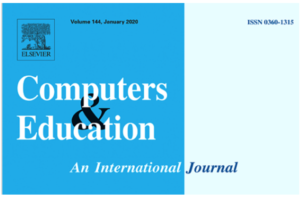Exploring four decades of research in Computers & Education
 A content analysis of abstracts and titles of 3674 full papers in Computers & Education published between 1976 and 2016 was conducted in order to a) identify and analyze their thematic and conceptual flow, b) how these reflected the evolving technologies and theories and c) how the research topics and concepts semantically related to each other. Abstracts and titles can be considered appropriate for such conceptual analysis since they are lexically dense and focus on the core issues presented in articles. Based on a relational concept analysis using a text-mining tool, the study revealed that over the course of these 40 years, the articles progressed through four distinct stages, reflecting major developments in educational technology and theories of learning with media: the advancement and growth of computer-based instruction (1976–1986); stand-alone multimedia learning (1987–1996); networked computers as tools for collaborative learning (1997–2006); and online learning in a digital age (2007–2016). The paper concludes by suggesting that such mapping and analysis of the literature in this and other fields of educational technology, including non-English language journals, books and conference proceedings, can provide a valuable overview of research and scholarship for communities of practice and inquiry around the globe.
A content analysis of abstracts and titles of 3674 full papers in Computers & Education published between 1976 and 2016 was conducted in order to a) identify and analyze their thematic and conceptual flow, b) how these reflected the evolving technologies and theories and c) how the research topics and concepts semantically related to each other. Abstracts and titles can be considered appropriate for such conceptual analysis since they are lexically dense and focus on the core issues presented in articles. Based on a relational concept analysis using a text-mining tool, the study revealed that over the course of these 40 years, the articles progressed through four distinct stages, reflecting major developments in educational technology and theories of learning with media: the advancement and growth of computer-based instruction (1976–1986); stand-alone multimedia learning (1987–1996); networked computers as tools for collaborative learning (1997–2006); and online learning in a digital age (2007–2016). The paper concludes by suggesting that such mapping and analysis of the literature in this and other fields of educational technology, including non-English language journals, books and conference proceedings, can provide a valuable overview of research and scholarship for communities of practice and inquiry around the globe.







